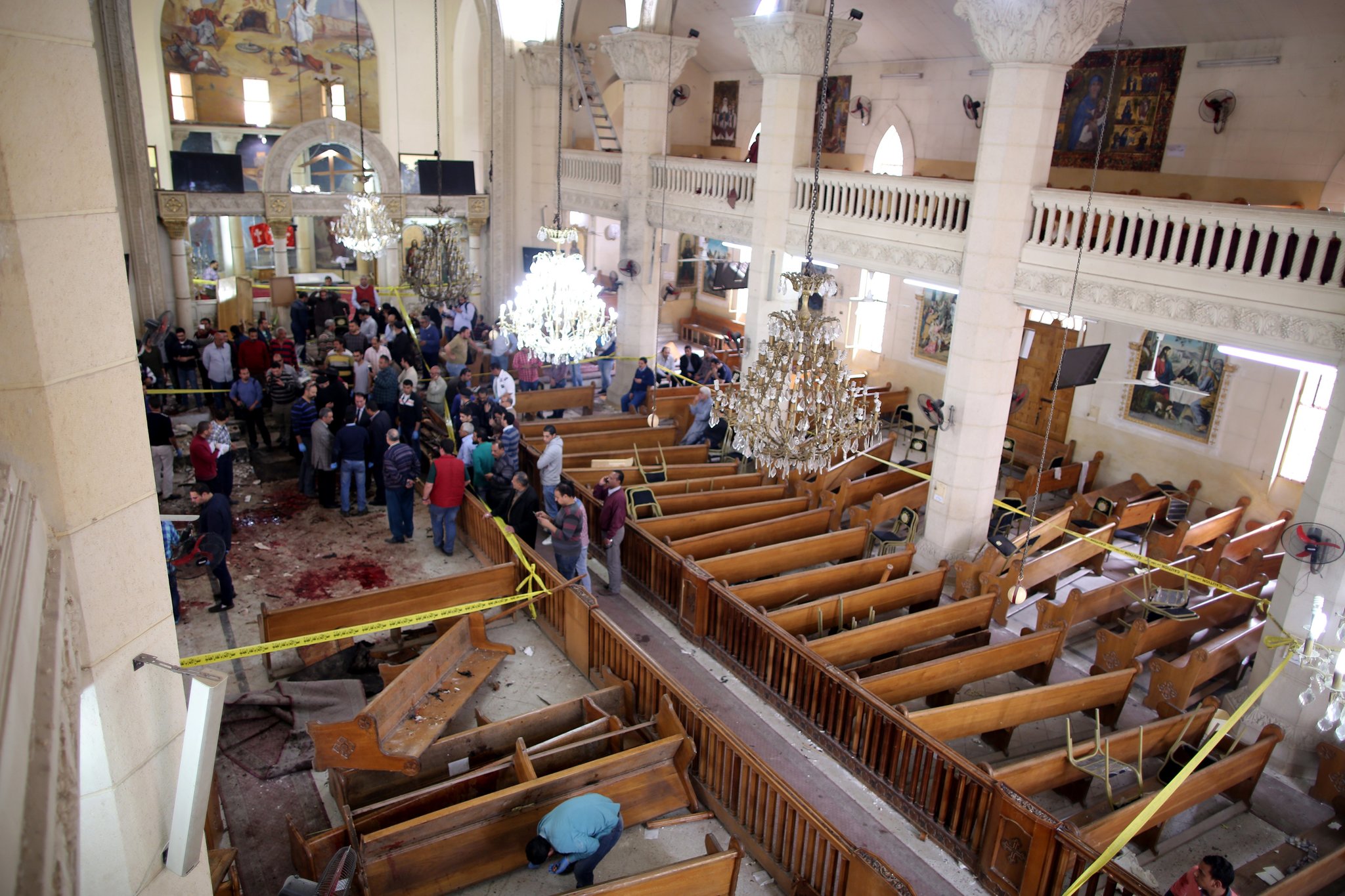Two explosions at Coptic churches in Egypt on Palm Sunday left at least 40 people dead and injured dozens of others as a day of worship in the besieged Christian community turned to destruction and carnage.
The first blast ripped through St. George’s Church in northern Egypt in the Nile Delta city of Tanta, 50 miles north of Cairo, during a Mass about 9:30 a.m., according to an official from the Health Ministry. The deputy minister of health put the death toll at 27.
Hours later, a suicide bomber set off an explosion outside the main Coptic church in Alexandria, St. Mark’s Cathedral, killing at least 13 — including three police officers — and injuring 21 others, the Health Ministry said.
Egyptians sit in shock at the scene of a bomb explosion inside St. George’s Church. Credit Khaled Elfiqi/European Pressphoto Agency
The explosions followed a number of attacks by Islamic State militants targeting Egypt’s minority Christians. And on Sunday, the group claimed responsibilty for both bombings.
An online statement shared by sympathizers and attributed to the militants said: “A security detachment of the Islamic State carried out the attacks against the two churches in the cities of Tanta and Alexandria.”
The bombings happened weeks before Pope Francis was to visit Egypt, and a week before Easter.
The second attack took place while worshipers at St. Mark’s were leaving at the end of Palm Sunday Mass. The service had been led by the Coptic pope, Tawadros II. The pope had already left when the explosion happened.
A security official told the state news agency they believed the blast had been caused by an explosive device planted inside the church.
After the first blast, President Abdel-Fattah el-Sisi ordered military hospitals to treat the injured, Sky News Arabia reported.
After that explosion, the provincial governor, Ahmad Deif, told the state-run Nile News channel, “Either a bomb was planted or someone blew himself up.”
Christians, mostly Orthodox Copts, account for about 10 percent of Egypt’s population, which is predominantly Sunni Muslim.
In December, the Islamic State claimed responsibility for a suicide attack on a chapel in the grounds of St. Mark’s Cathedral, the main Coptic Church in Cairo, killing at least 28 people.
In February, hundreds of Christians fled northern Sinai, where the Egyptian Army is fighting a local Islamic State affiliate, following a targeted campaign of violence and intimidation.
In 2011, a suicide bombing ripped through a throng of worshipers outside a Coptic Christian church in the port city of Alexandria, killing at least 21 people in one of the worst attacks against Egypt’s Christian minority.
Earlier this month, an explosion near a police training center in the Nile Delta city injured 13 officers.
Francis’ planned trip to the country is seen as an opportunity to improve ties between Christians and Muslims. The pontiff is to visit with Mr. Sisi; the leader of the Coptic Orthodox Church; and the grand imam of Al Azhar, a 1,000-year-old mosque and university that is revered by Sunni Muslims.
In a news conference to provide details about the trip on Friday, the Catholic archbishop of Egypt, Bishop Emmanuel, said that the pope’s pending journey was a signal that Egypt is safe for visitors.
On Sunday, Francis said in response to the first bombing: “We pray for the victims of the attack carried out today, this morning, in Cairo, in a Coptic church.”
He called the leader of the Coptic Christians his “brother” and expressed his “deep condolences” to the church and the Egyptian nation.
The archbishop of Canterbury, Justin Welby, also responded in a post on Twitter: “As we come to Easter, pray for victims, the justice of the cross, hope & healing of resurrection.”
In a Twitter post, a spokesman for the Egyptian Foreign Affairs Ministry, Ahmed Abu Zeid, said, “Terrorism hits Egypt again.” BBC
